Tissue Engineering SIG Quarterly Newsletter
Society For Biomaterials - Tissue Engineering SIG Newsletter [Winter 2022]

Welcome to the Tissue Engineering SIG Q4 Newsletter of 2022! We are excited to launch this new newsletter to improve communications and foster community within our SIG.
The Society For Biomaterials invites you to attend SFB 2023 Annual Meeting in San Diego, California, April 19-22, 2023. Hotel registration is now open, so we invite you to book the Sheraton San Diego Hotel at a discounted rate of $225/night + taxes)! The deadline for hotel reservations is Monday, March 27, 2023. Book here.
SIG Member Spotlight

Associate Professor of Biomedical Engineering at Texas A&M University
Spotlight on Dr. Feng Zhao, PhD!
What has been the evolution of your research from your dissertation to now? How did you find your niche? My PhD study was on chitosan biomimetic materials for tissue engineering. The methods I developed were highly cited and are now widely used for bone regeneration. During my postdoctoral study, I extended my study of chitosan composite materials and demonstrated its excellent biomimetic properties on human mesenchymal stem cells (hMSC) growth and osteogenic differentiation. I also performed the original study on perfusion bioreactor system for hMSC expansion and played a leading role in the subsequent studies on oxygen transport and shear stress regulation in the 3D multiphase system. As the concept of engineered microenvironment evolves, I explored human endothelial cell adhesion and function when grafted under physiologically relevant conditions reproduced in a perfusion bioreactor system. This approach has important implications in improving the performance of vascular grafts for implantation. The results obtained from this project led to a Young Clinical Scientist Award (Title: Small Diameter Blood Vessel Regeneration by Biomimetic Engineering) from the Flight Attendant Medical Research Institute, which supported my transition from a trainee to an independent principal investigator. After joining the faculty at the Michigan Technological University, I built a research stem cell and tissue engineering lab focusing on vascular biomaterials and engineering research. With the efforts from postdocs and students, my research field was expanded to vascular graft engineering, cardiac patch engineering, lymphatic vessel engineering and 3D tissue vascularization.
Where do you see your field in the next 10 years? Cardiovascular tissue engineering provides promising therapeutic and diagnosis strategies to cardiovascular diseases. I expect more and more products will be employed in clinical trials and interventions. I hope some of our products can be in the list.
What advice would you give to the emerging faculty about acquiring federal funding? Keep writing, keep submitting, keep publishing and keep adding new results in the proposal.
What has your motivation been to stay in academics versus going into the industry? I have the freedom to do projects that I am really interested in. I enjoy working with young people and training them to be bioengineers who can contribute to the improvement of human health.
How has your experience been about re-starting your lab at a different institution? What were some of the challenges you faced We moved from Michigan Technological University to Texas A&M University in July 2020, the hottest time for pandemic in Texas. It was risky, but my students and I were very excited. We fully established a new lab and made it functional within one year. The main challenge during that period was delays in equipment installation and other technical issues. Now when we look back, it was a successful move and we are happy we made it.
News from Our SIG

Source: Zhao et al., Nat Rev Methods Primers 2, 94 (2022).
New Publication: "Organoids" in Nature Reviews (2022) by Zhao et al. (Click here to read!)
Dr. Wang and others highlight the rationale underlying the establishment of organoid cultures and provide guiding principles for selecting suitable materials, methods, and protocols for different applications. The critical considerations for generating robust organoids have been further discussed, such as those related to cell isolation and seeding, matrix and soluble factor selection, physical cues and integration (see Graphic Abstract), as well as the general standards for data quality, reproducibility and deposition within the organoid community.

Source: Zamani et al., Advanced Functional Materials, 2203069, 2022.
New Publication: "Single-Cell Transcriptomic Census of Endothelial Changes Induced by Matrix Stiffness and the Association with Atherosclerosis" in Advanced Functional Materials (2022) by Zamani et al. (Click here to read!)
Dr. Huang and colleagues characterize at single-cell resolution the transcriptional programs that underpin endothelial cell plasticity in both physiological or pathological stiffness milieus to precisely define endothelial-to-mesenchymal transition and the transcriptional programs contributing to atherosclerosis.
News from Dr. Jessica Gluck’s laboratory at NCSU: Graduate student Kiran M. Ali was awarded funding from the Comparative Medicine Institute's Young Scholars Program for her proposal "Recapitulating the microenvironment of stem cell derived cardiomyocytes with the help of 3D bioprinting.” Another new collaboration seeks to explore circadian rhythm in stem cell-derived cardiomyocytes. Graduate student Suh Hee Cook wins People's Choice in Three Minute Thesis Competition for "Conductive Scaffolds to Mature Induced Pluripotent Stem Cell-Derived Cardiomyocytes."
Help Wanted!
Seeking speakers for NCSU’s Virtual Tissue Engineering Seminar. Please email Dr. Jessica Gluck at jmgluck@ncsu.edu if interested.
Submit your news for the upcoming Tissue Engineering SIG newsletter here! News can include publications, fellowships, job postings, events, conferences, calls for abstracts, calls for collaboration, awards, or anything exciting going on in your lab/institution/etc. The submission deadline for the next quarterly is Feb 28th, 2023.
From your Tissue Engineering SIG Leadership,
Ngan F. Huang, Chair (ngantina@stanford.edu)
Jeannine Coburn, Vice Chair (jmcoburn@wpi.edu)
Qun Wang, Secretary/Treasurer (qunwang@iastate.edu)
Gulden Camci-Unal, Program Chair (Gulden_CamciUnal@uml.edu)
Newsletter designed by Suh Hee Cook

